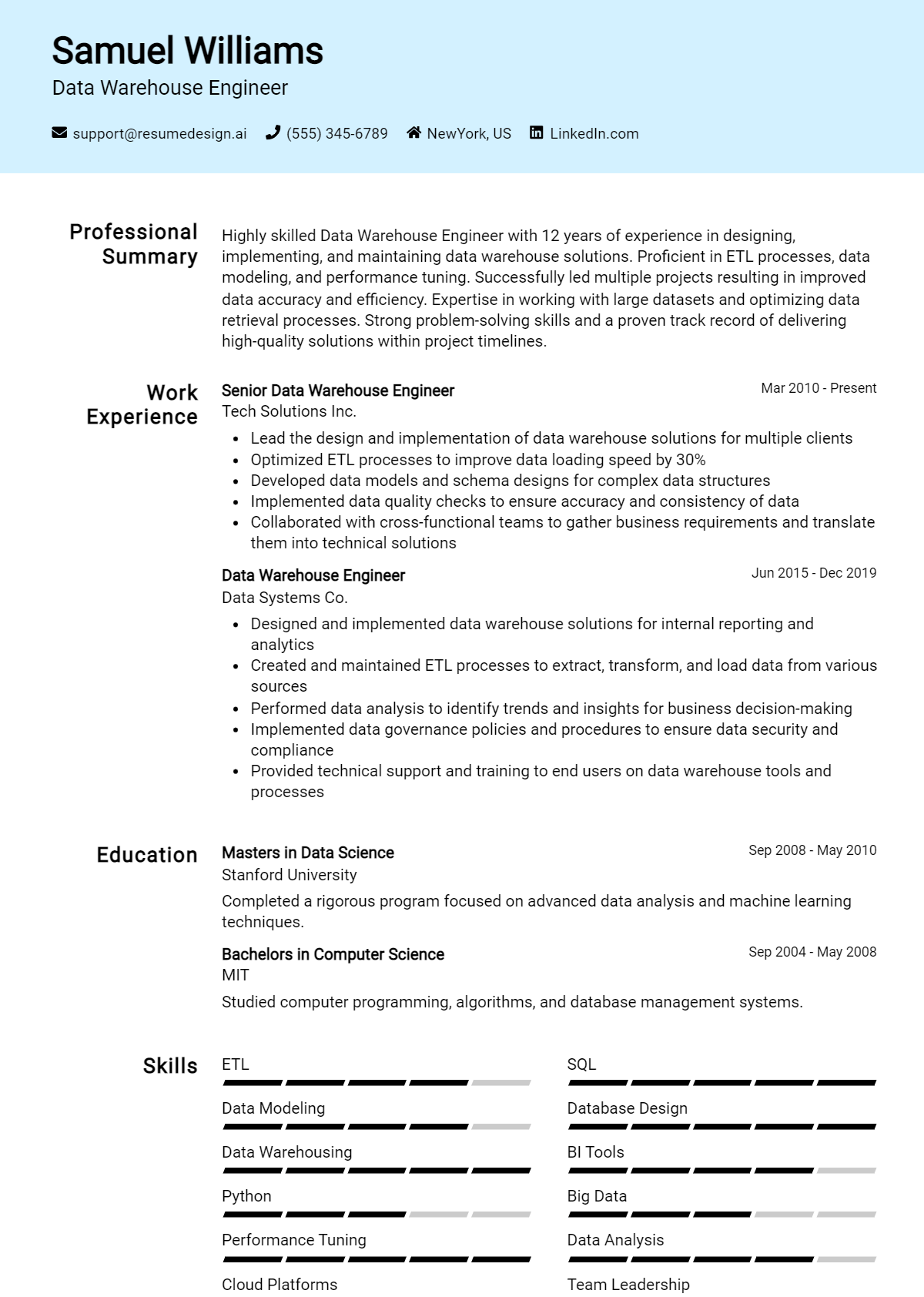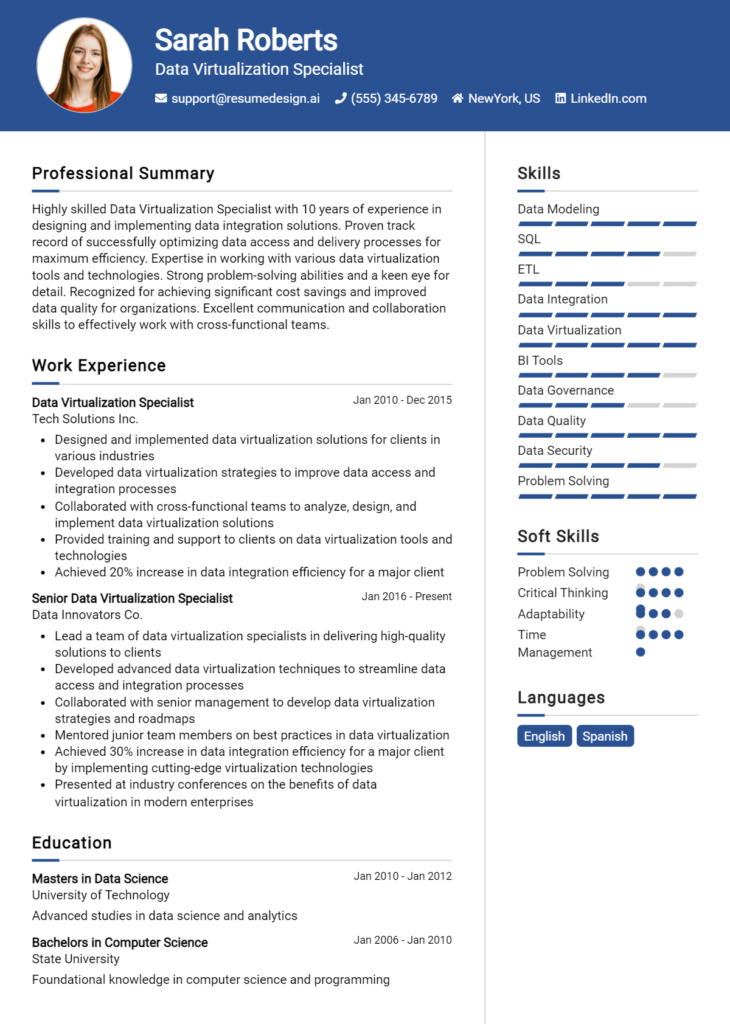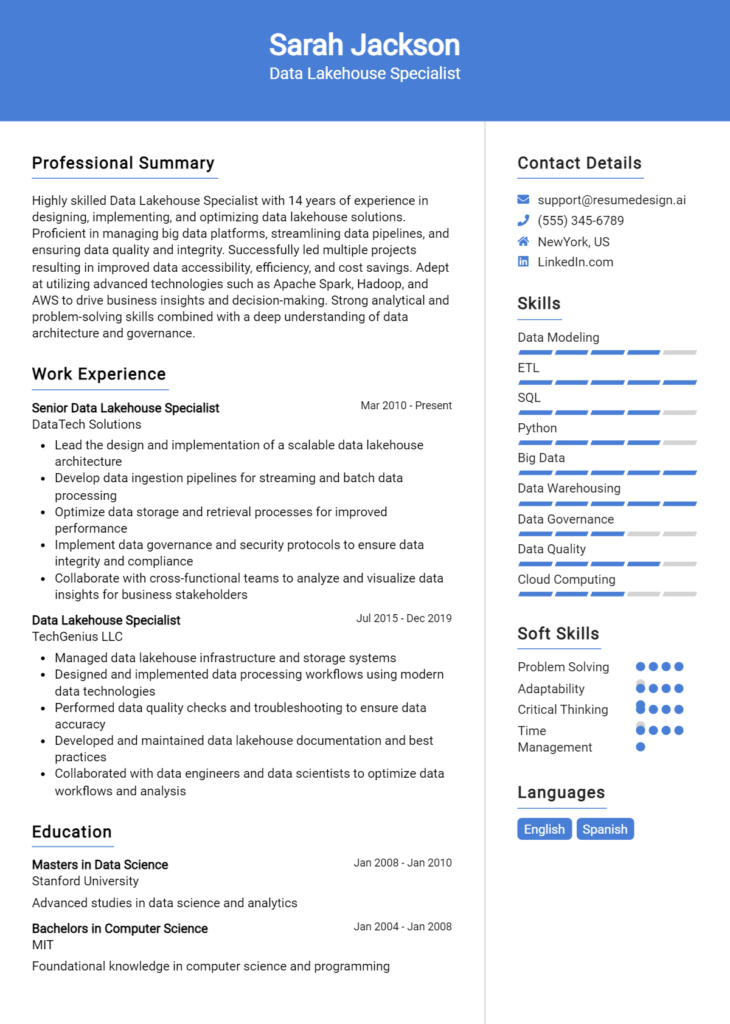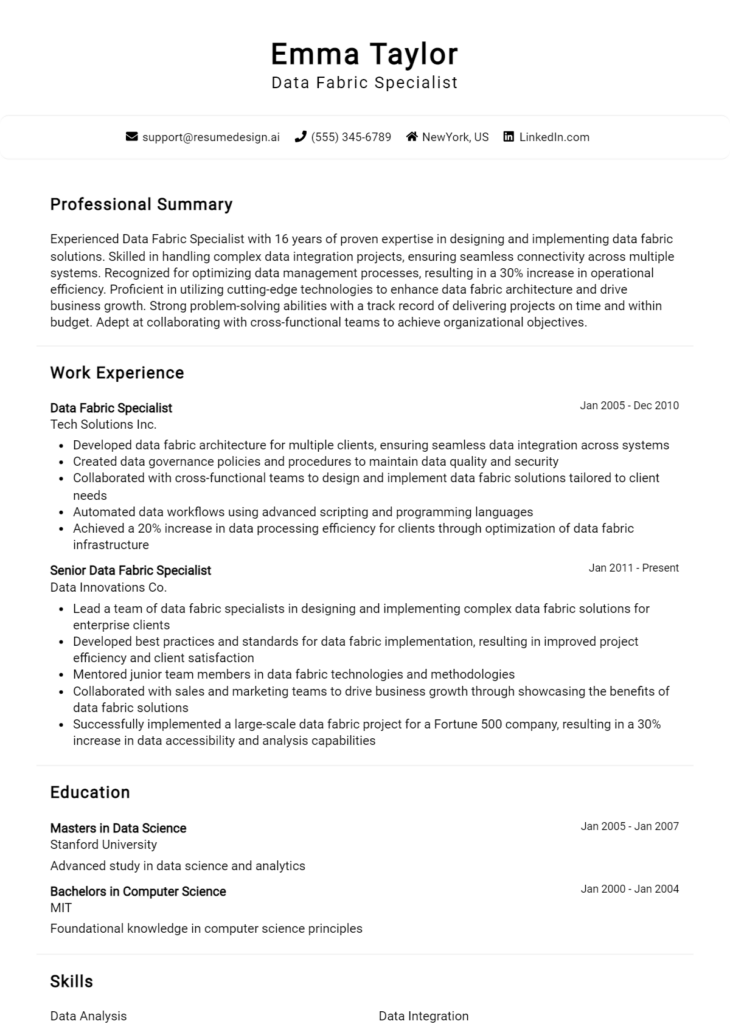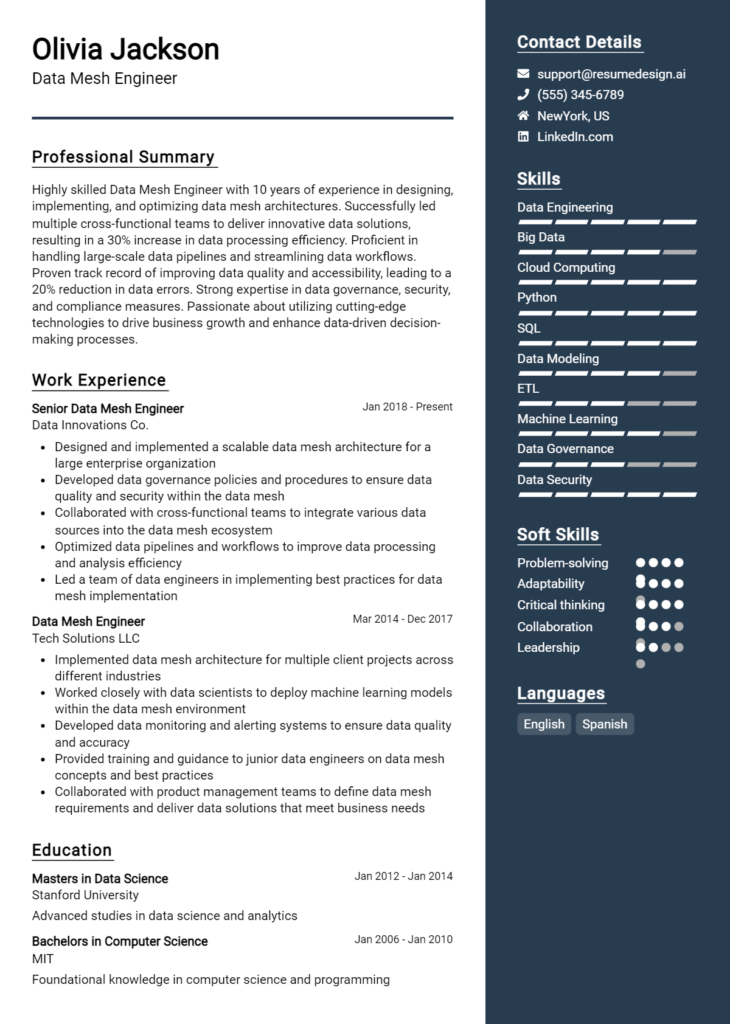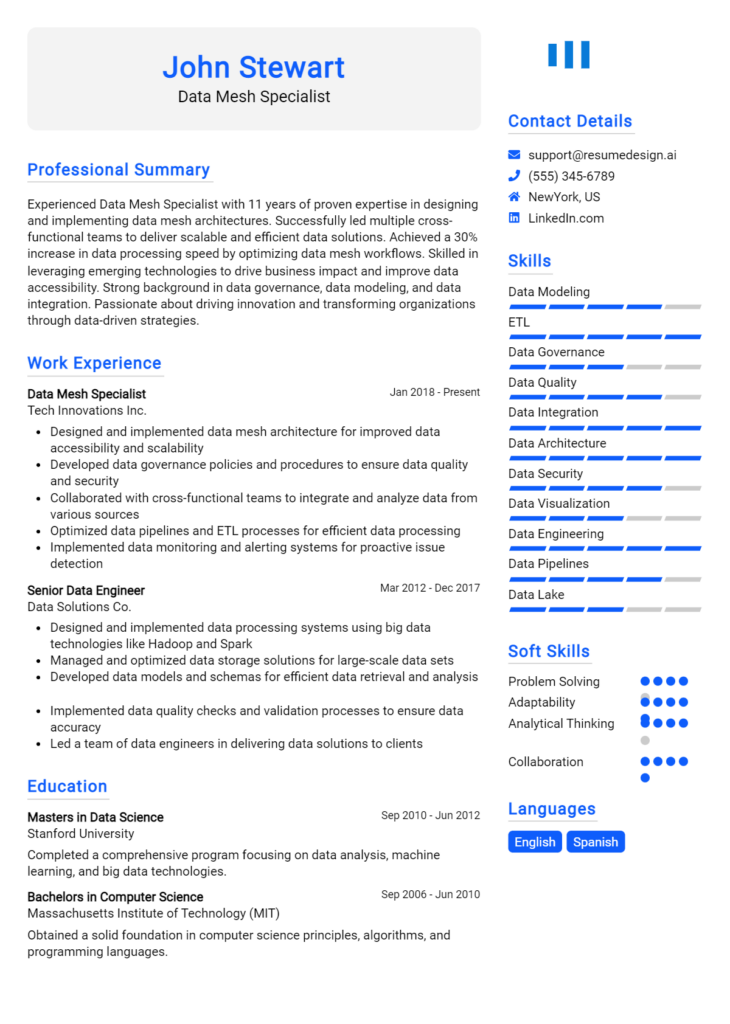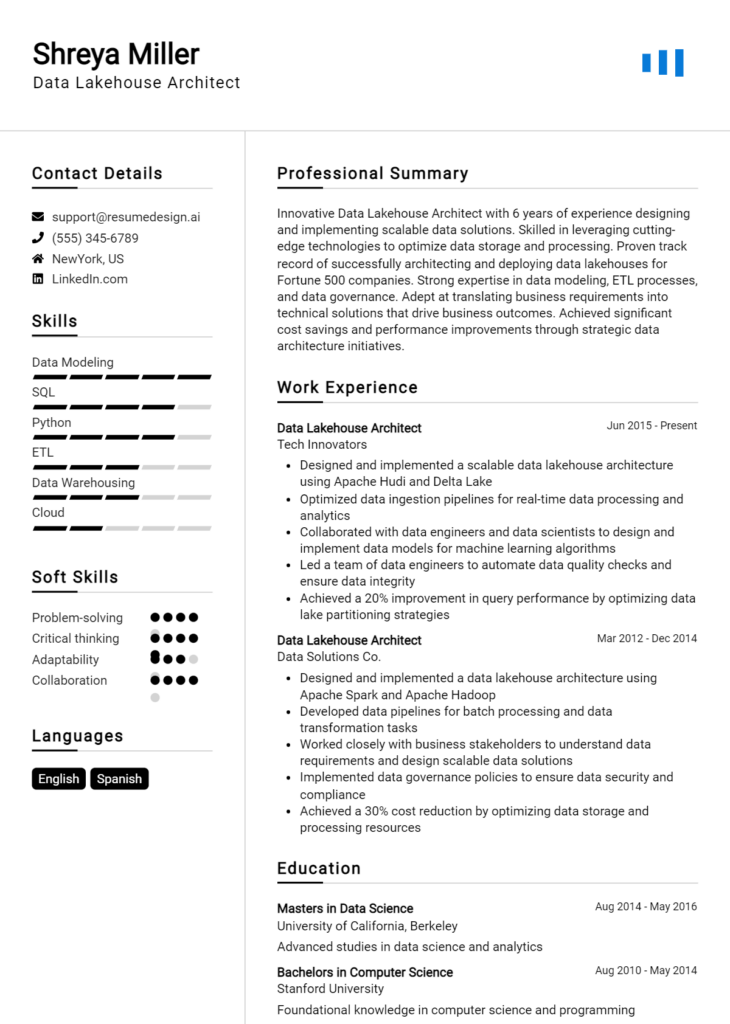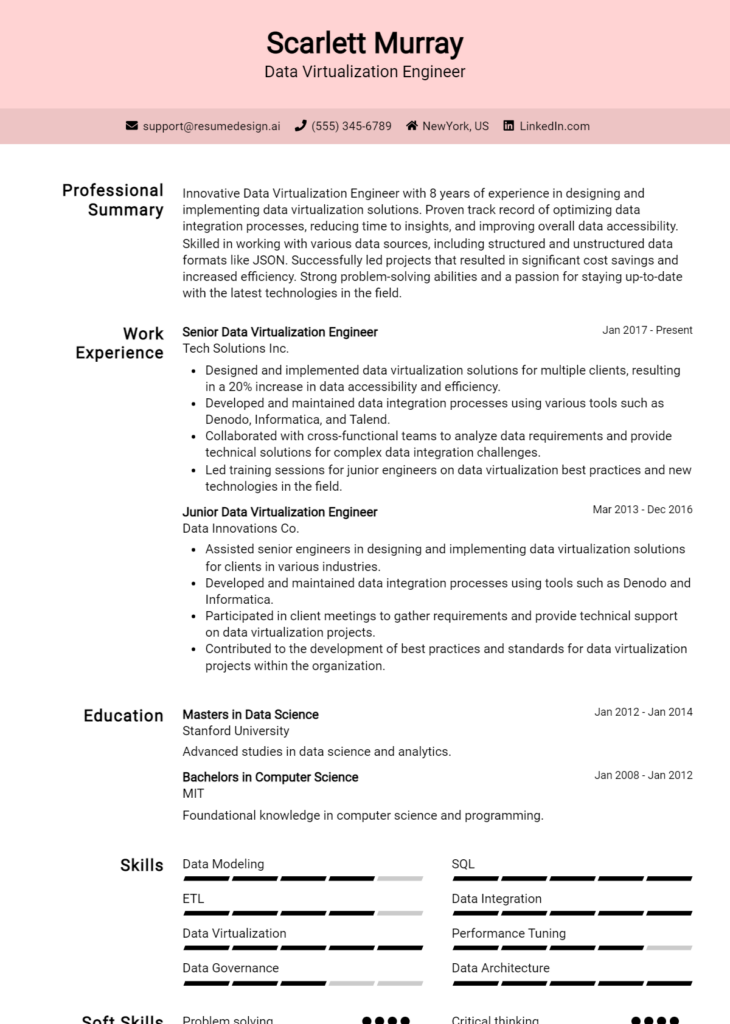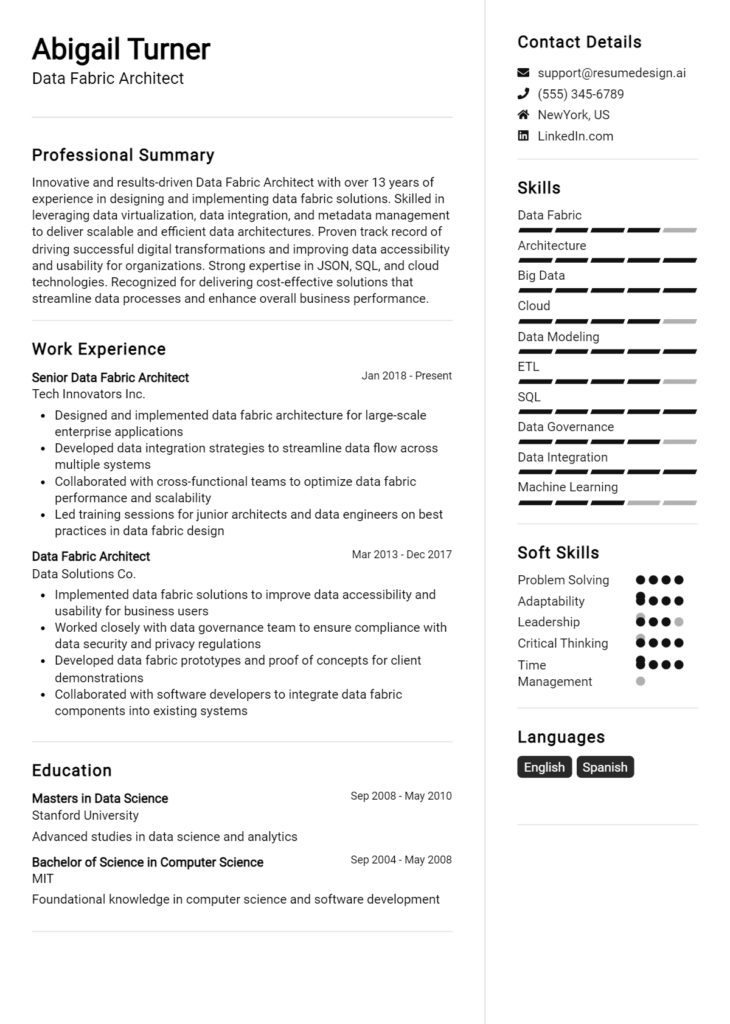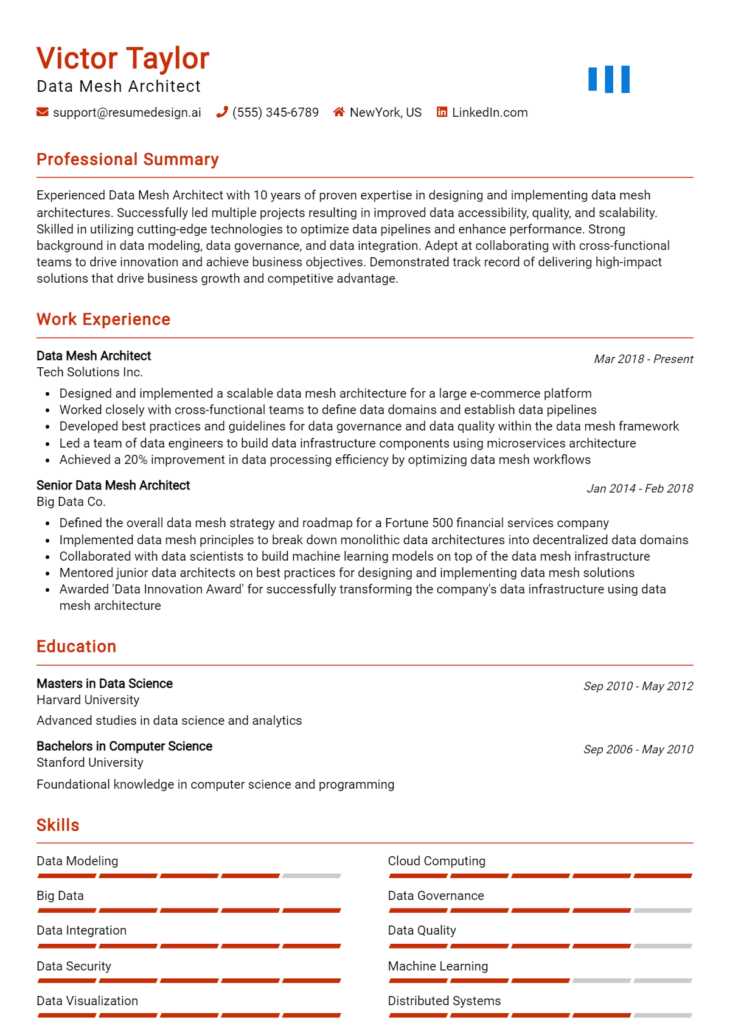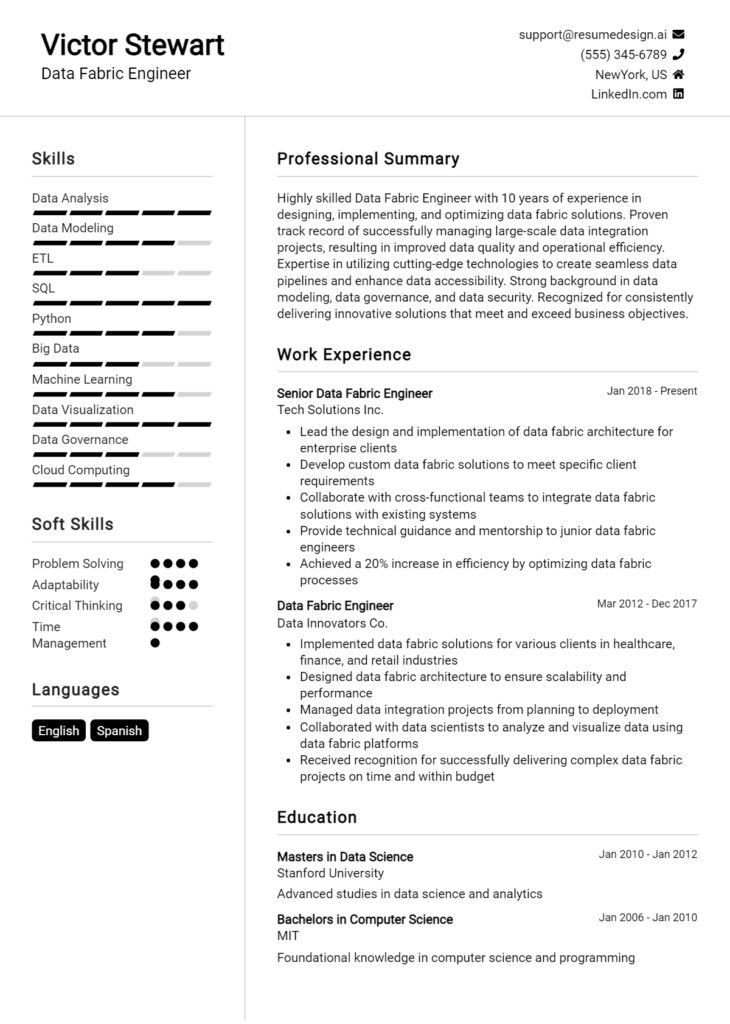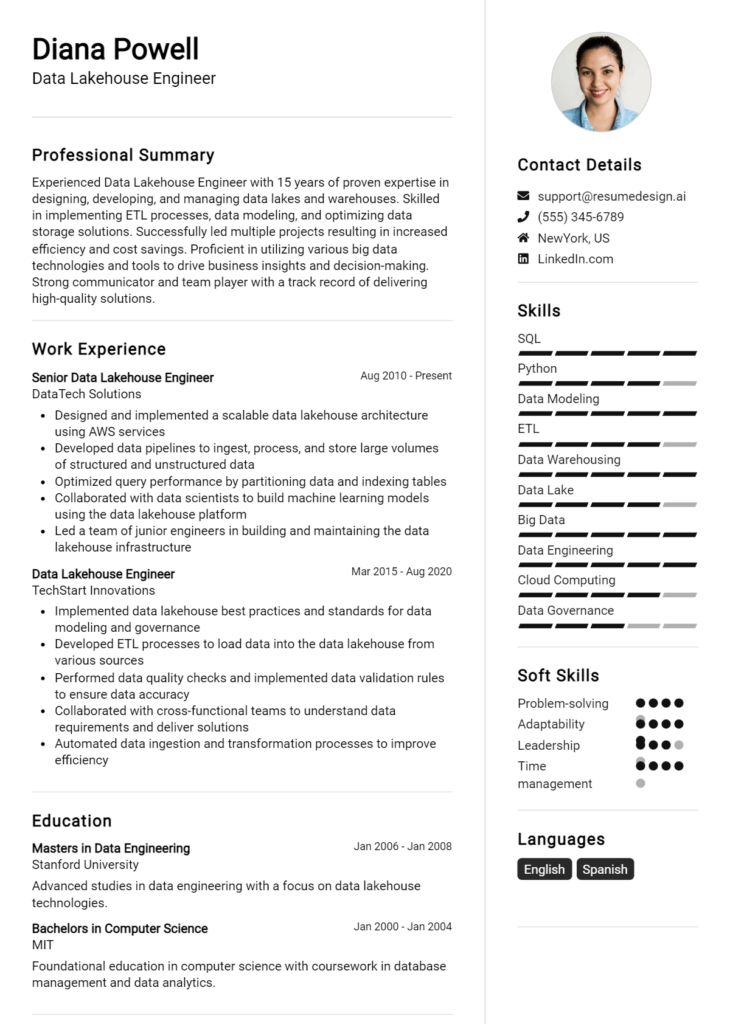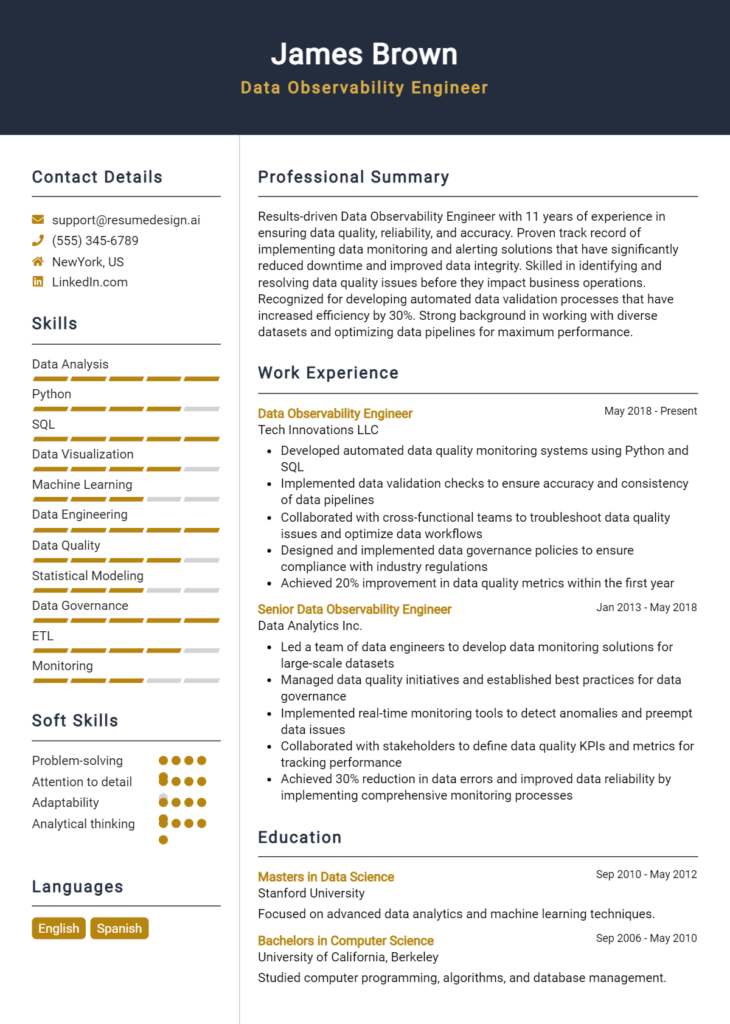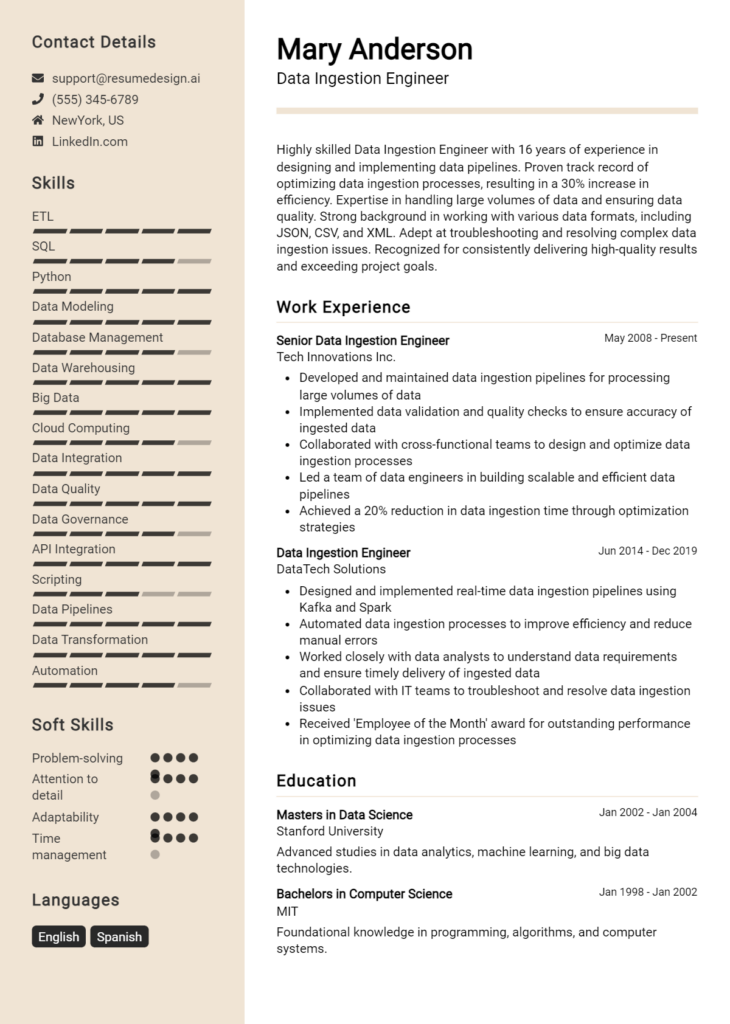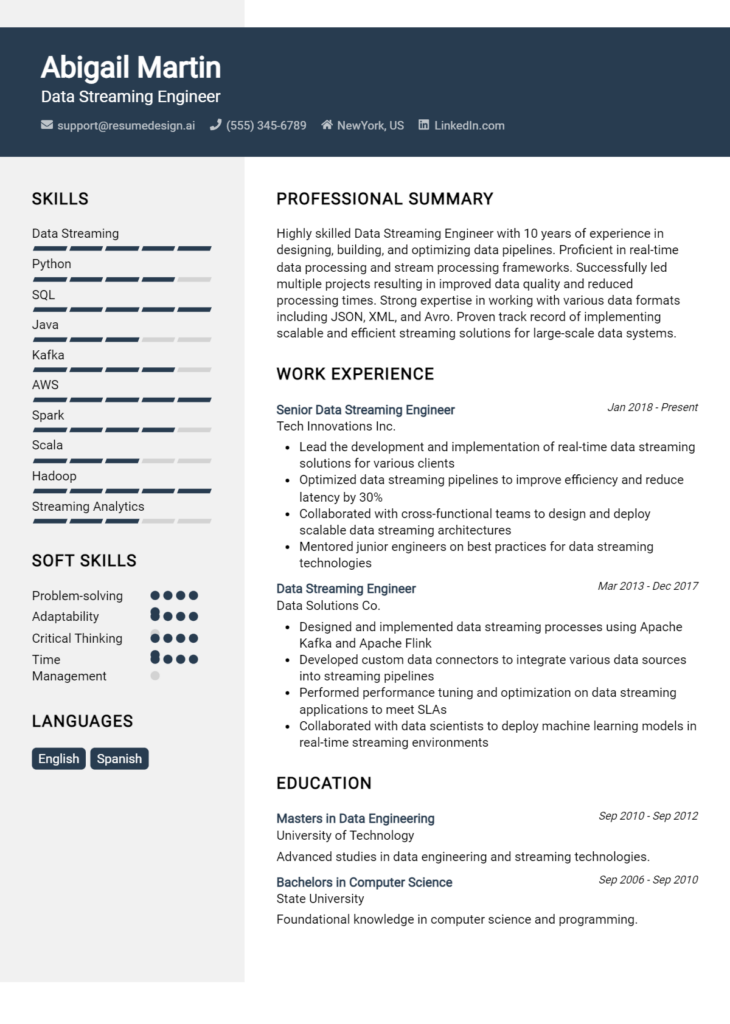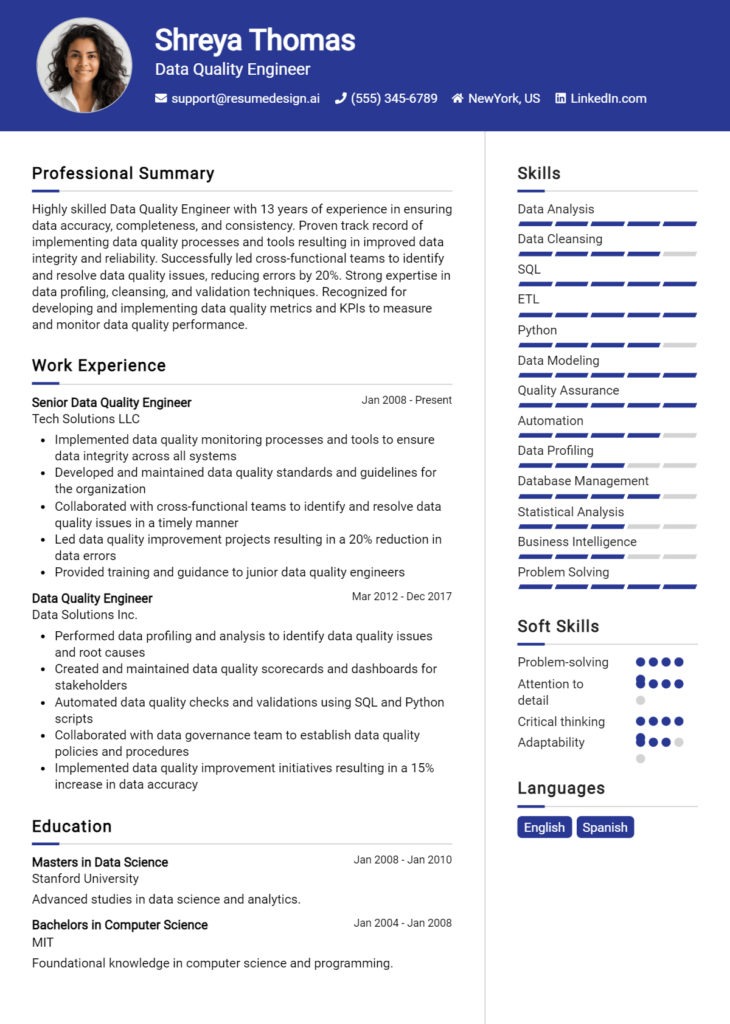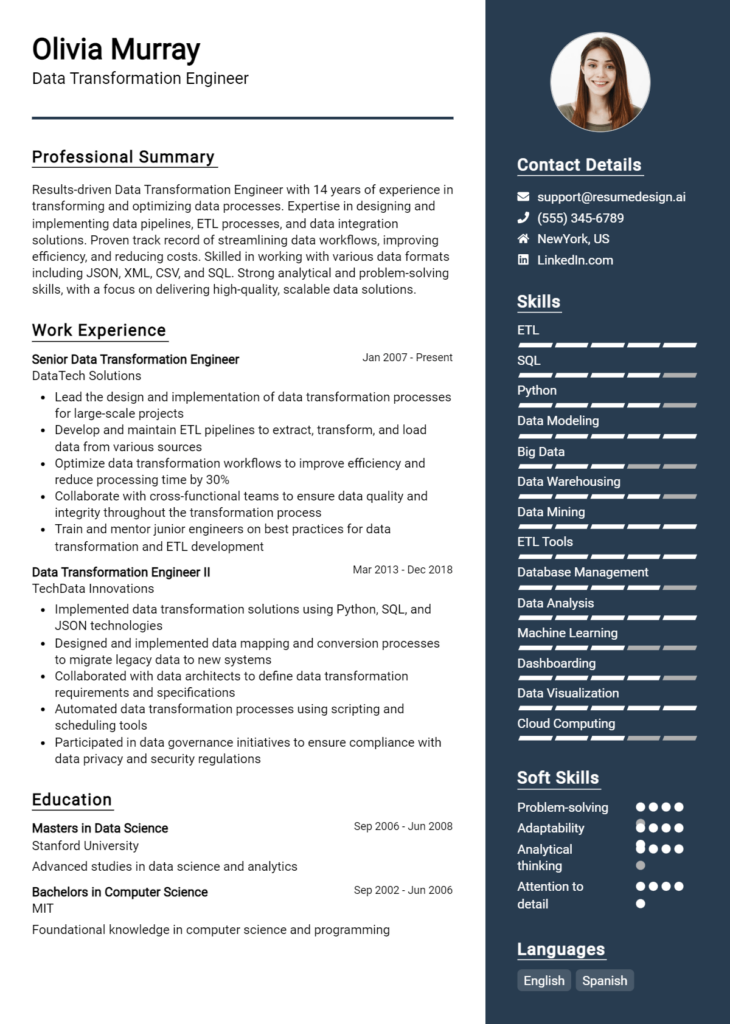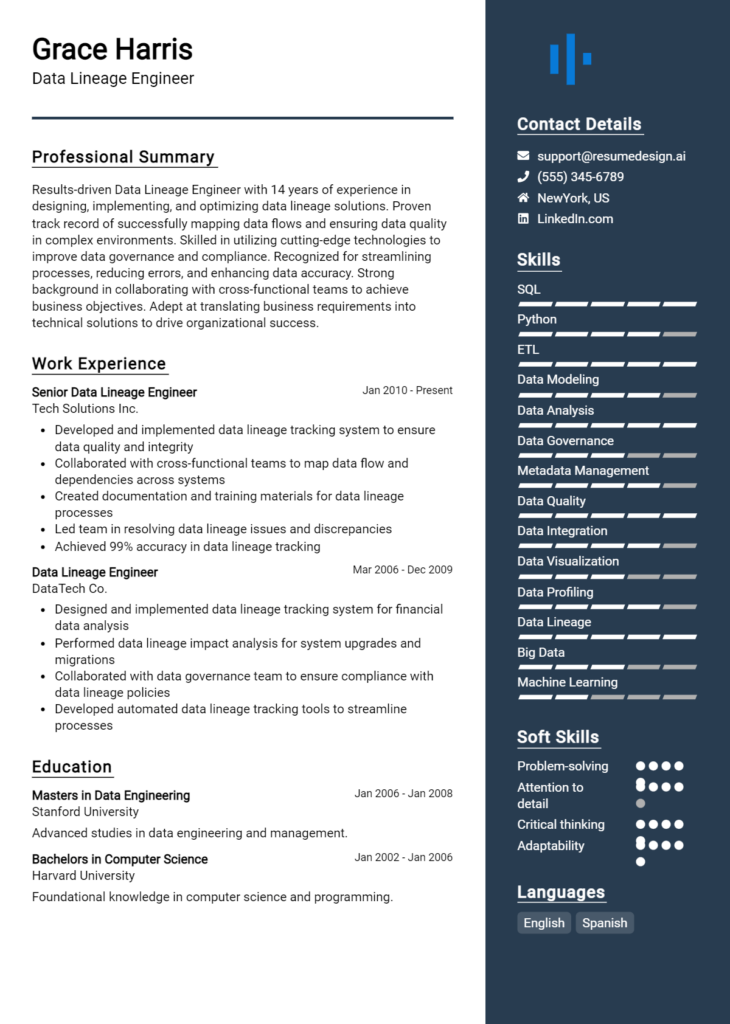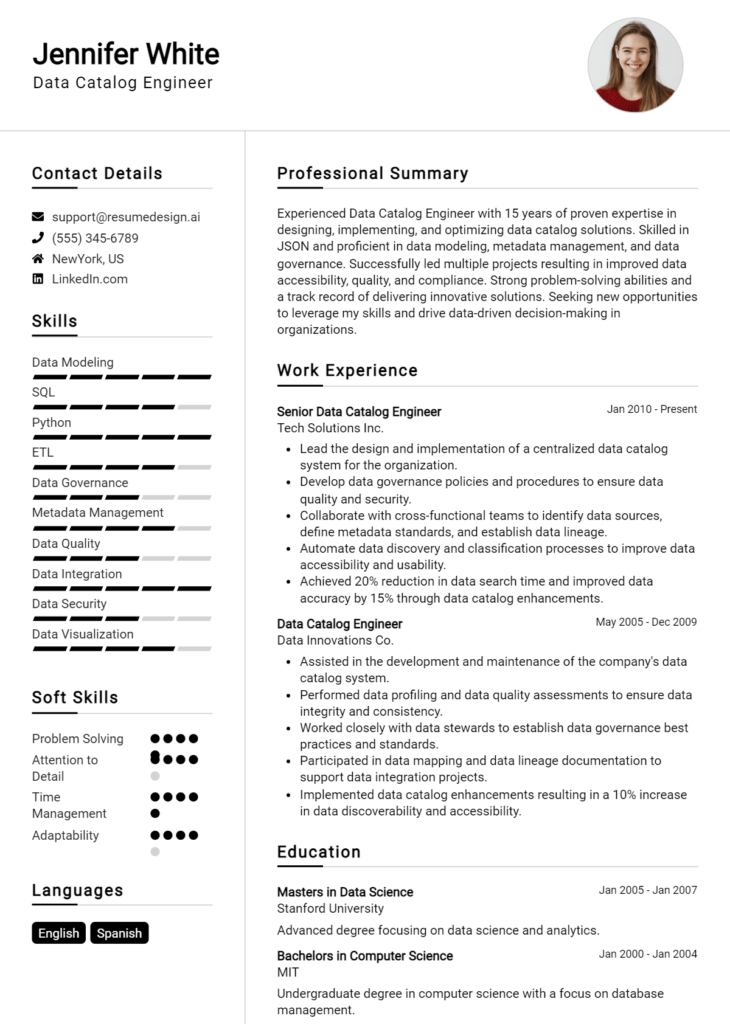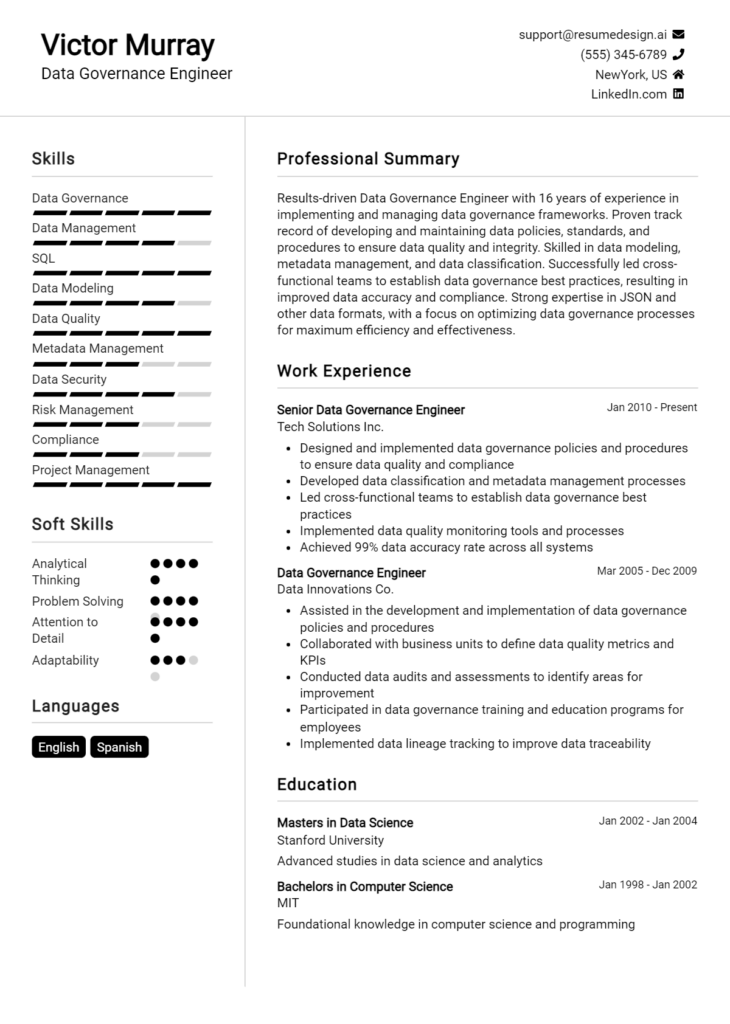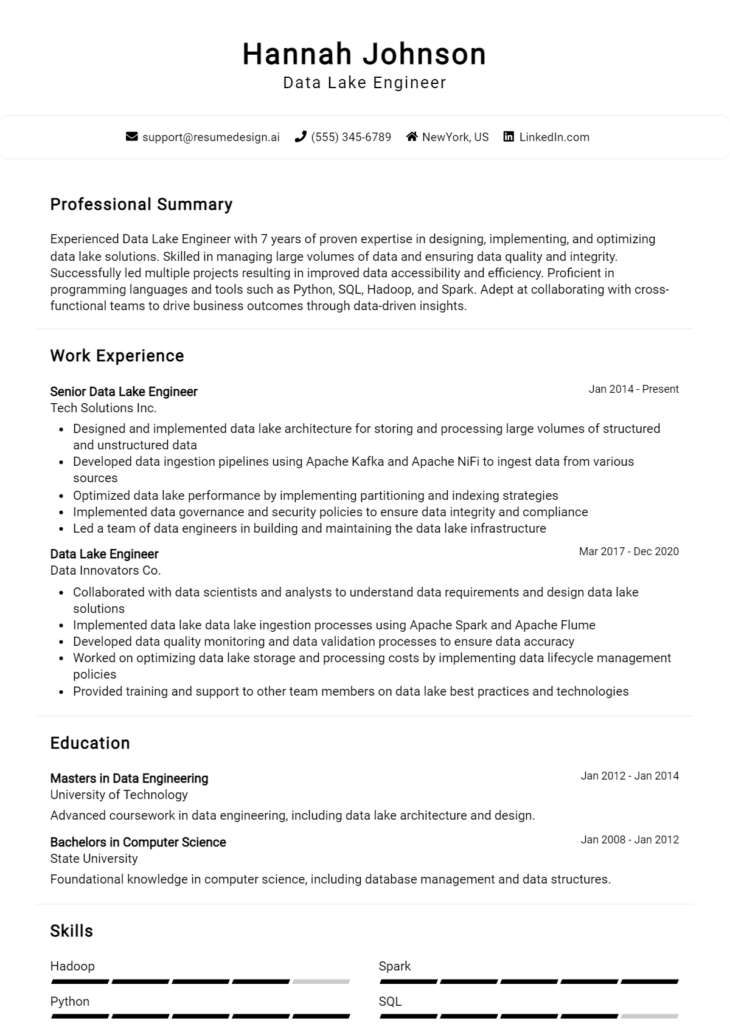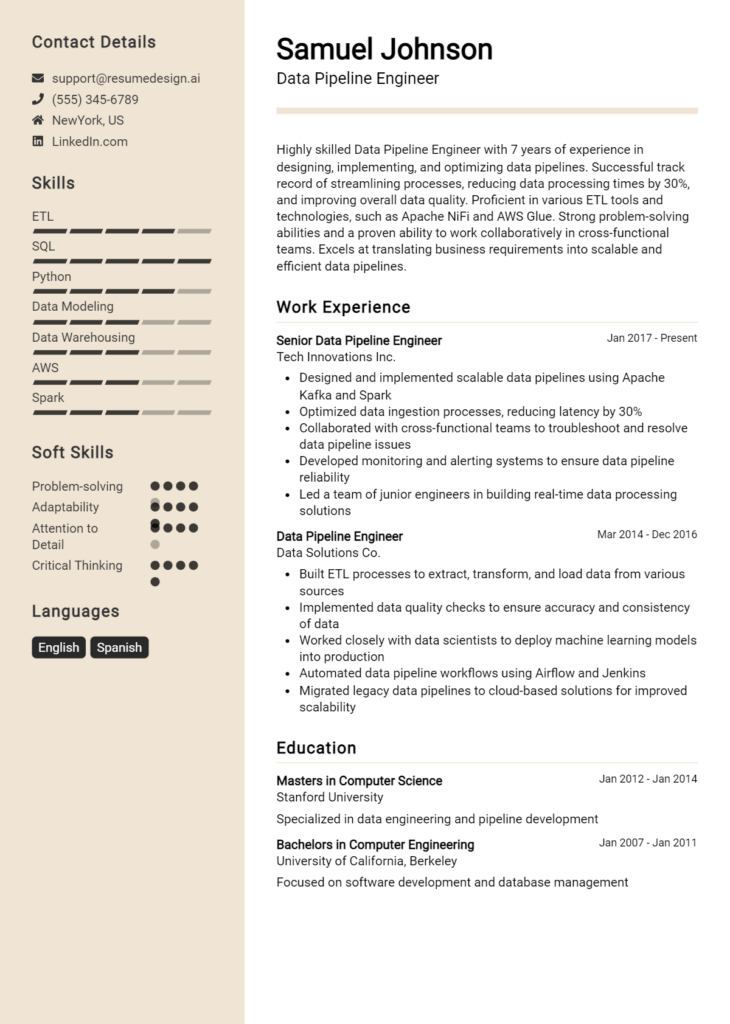Data Warehouse Engineer Core Responsibilities
A Data Warehouse Engineer plays a crucial role in facilitating data management and analytics across various departments. Key responsibilities include designing, developing, and maintaining data warehouse systems while ensuring data integrity and accessibility. Essential skills encompass strong technical expertise in ETL processes, SQL proficiency, and problem-solving capabilities. This role effectively bridges IT and business function by delivering valuable insights, ultimately contributing to organizational goals. A well-structured resume can effectively showcase these qualifications, highlighting the engineer's impact on data-driven decision-making.
Common Responsibilities Listed on Data Warehouse Engineer Resume
- Design and implement data warehouse architecture and infrastructure.
- Develop ETL processes for data extraction, transformation, and loading.
- Ensure data quality and integrity through rigorous testing and validation.
- Collaborate with stakeholders to gather requirements and optimize data solutions.
- Monitor and troubleshoot data warehouse performance and efficiency.
- Maintain documentation related to data systems and workflows.
- Implement security measures to protect sensitive data.
- Provide technical support and training for end-users.
- Stay updated on industry trends and best practices in data warehousing.
- Integrate data from various sources for comprehensive reporting.
- Conduct regular audits to ensure compliance with data governance policies.
- Collaborate with data analysts to enhance data visualization and reporting tools.
High-Level Resume Tips for Data Warehouse Engineer Professionals
In today's highly competitive job market, a well-crafted resume is essential for Data Warehouse Engineer professionals seeking to make a lasting impression. Your resume is often the first point of contact with potential employers, serving as a key marketing tool that reflects your skills, experiences, and accomplishments. A focused and polished resume not only showcases your technical abilities but also communicates your understanding of data management and analytics. This guide will provide practical and actionable resume tips specifically tailored for Data Warehouse Engineer professionals, helping you to stand out and effectively present your candidacy.
Top Resume Tips for Data Warehouse Engineer Professionals
- Tailor your resume to each job description by incorporating relevant keywords and skills mentioned in the posting.
- Highlight your experience with specific data warehousing tools and technologies such as ETL processes, SQL, and cloud platforms.
- Quantify your achievements by using metrics and data; for example, mention the percentage by which you improved data retrieval times.
- Include a dedicated "Technical Skills" section that lists industry-specific tools and languages you are proficient in.
- Showcase your ability to work with large datasets and complex queries, emphasizing any experience with data modeling and architecture.
- Detail your collaborative experiences with cross-functional teams to highlight your communication and teamwork skills.
- Use action verbs and concise language to make your resume impactful and easy to read.
- Keep your resume to one or two pages, focusing on the most relevant and recent experiences.
- Incorporate any certifications or training in data warehousing, analytics, or related fields to demonstrate your commitment to professional development.
By implementing these tips, you can significantly increase your chances of landing a job in the Data Warehouse Engineer field. A polished and tailored resume not only underscores your qualifications but also conveys your dedication to the profession, making you a compelling candidate for prospective employers.
Why Resume Headlines & Titles are Important for Data Warehouse Engineer
In the competitive landscape of data warehousing, the role of a Data Warehouse Engineer is crucial for organizations looking to leverage data for strategic decisions. A well-crafted resume headline or title plays a vital role in capturing the attention of hiring managers and summarizing a candidate's key qualifications in a succinct and impactful manner. A strong headline should be concise, relevant, and directly related to the job being applied for, allowing candidates to stand out in a pool of applicants by showcasing their expertise and suitability for the role right from the outset.
Best Practices for Crafting Resume Headlines for Data Warehouse Engineer
- Keep it concise: Aim for a headline that is brief yet informative, ideally no more than 10 words.
- Be specific: Tailor your headline to reflect the exact role and expertise you bring to the table.
- Highlight key skills: Incorporate relevant skills or technologies that align with the job description.
- Use action-oriented language: Start with strong action verbs to convey your impact and contributions.
- Include years of experience: If applicable, mention your years of experience to establish credibility.
- Focus on results: Emphasize achievements or outcomes that demonstrate your effectiveness in previous roles.
- Reflect industry terminology: Use keywords that are common in the data warehousing field to resonate with hiring managers.
- Avoid clichés: Steer clear of overused phrases that do not add value to your headline.
Example Resume Headlines for Data Warehouse Engineer
Strong Resume Headlines
"Expert Data Warehouse Engineer with 5+ Years in ETL and BI Solutions"
“Results-driven Data Warehouse Specialist Skilled in AWS & SQL Development”
“Data Warehousing Professional with Proven Success in Data Migration and Transformation”
“Accomplished Data Warehouse Engineer Focused on Performance Optimization and Scalability”
Weak Resume Headlines
“Data Engineer”
“Experienced Professional Seeking Opportunities”
Strong resume headlines are effective because they clearly articulate the candidate’s core strengths and specific expertise, making it easy for hiring managers to understand their qualifications at a glance. They utilize industry-specific terminology and highlight relevant skills, creating a compelling first impression. In contrast, weak headlines fail to impress because they are vague, lack specific details, and do not convey any unique value, making it difficult for employers to see what the candidate can bring to the role. By avoiding generic titles, candidates can enhance their chances of standing out in a competitive job market.
Writing an Exceptional Data Warehouse Engineer Resume Summary
A resume summary is a crucial component for a Data Warehouse Engineer, serving as a powerful first impression that can significantly influence a hiring manager's decision. In a highly competitive job market, a strong resume summary succinctly highlights the candidate's key skills, relevant experience, and notable accomplishments, effectively capturing the attention of employers. It should be concise, impactful, and tailored to align with the specific requirements of the job being applied for, ensuring that the candidate stands out as a strong contender right from the start.
Best Practices for Writing a Data Warehouse Engineer Resume Summary
- Quantify Achievements: Use specific numbers and metrics to showcase your impact, such as data processing speeds or cost reductions.
- Focus on Relevant Skills: Highlight technical skills and tools that are specifically mentioned in the job description, such as SQL, ETL processes, or data modeling.
- Tailor for the Job: Customize your summary for each application to reflect the requirements and responsibilities outlined in the job posting.
- Keep it Concise: Limit your summary to 2-4 sentences to maintain clarity and focus.
- Use Action Verbs: Start sentences with strong action verbs to convey confidence and proactivity.
- Showcase Industry Knowledge: Mention specific industry standards, methodologies, or technologies relevant to data warehousing.
- Include Soft Skills: Briefly highlight interpersonal skills such as teamwork or problem-solving, which are essential in collaborative environments.
- Avoid Jargon: While technical language is important, ensure that your summary is still accessible to non-technical hiring managers.
Example Data Warehouse Engineer Resume Summaries
Strong Resume Summaries
Data Warehouse Engineer with over 5 years of experience in designing and implementing scalable ETL processes, resulting in a 30% increase in data retrieval efficiency. Proficient in SQL, Python, and cloud technologies, with a solid track record of collaborating with cross-functional teams to optimize data solutions.
Dynamic Data Warehouse Engineer skilled in data modeling and architecture, successfully reduced data processing times by 25% through innovative design strategies. Experienced in leveraging tools such as AWS Redshift and Tableau to deliver actionable insights, enhancing decision-making processes for stakeholders.
Results-driven Data Warehouse Engineer with expertise in data integration and analytics, leading projects that improved reporting accuracy by 40%. Adept at using Informatica and Oracle to streamline workflows and ensure data integrity across systems.
Weak Resume Summaries
Experienced professional with a background in data warehousing looking for new opportunities. Good knowledge of database systems and data management.
Data Warehouse Engineer with various skills and experience in the field. Seeking to apply my knowledge in a challenging role.
The examples provided illustrate the stark contrast between strong and weak resume summaries. Strong summaries are characterized by their specificity, quantifiable achievements, and direct relevance to the Data Warehouse Engineer role, effectively demonstrating the candidate's value. In contrast, weak summaries lack detail and clarity, failing to convey the candidate's unique qualifications or impact, which can leave hiring managers unimpressed and uninformed about the candidate's potential contributions.
Work Experience Section for Data Warehouse Engineer Resume
The work experience section of a Data Warehouse Engineer resume is critical, as it serves as a platform to demonstrate the candidate's technical skills, leadership capabilities, and the ability to deliver high-quality data solutions. This section not only highlights past job roles but also showcases how the candidate has successfully managed teams, executed projects, and contributed to organizational objectives. Quantifying achievements, such as improved data processing times or increased system efficiencies, is essential for illustrating the impact of one's work. Furthermore, aligning experience with industry standards is crucial for demonstrating relevance and expertise in the field.
Best Practices for Data Warehouse Engineer Work Experience
- Use specific metrics to quantify your achievements (e.g., reduced data retrieval time by 30%).
- Highlight relevant technologies and tools (e.g., SQL, ETL processes, data modeling).
- Emphasize collaboration with cross-functional teams to showcase teamwork skills.
- Detail your role in major projects and the outcomes achieved.
- Focus on continuous improvement and innovation in data warehouse solutions.
- Align your experience with industry best practices and standards.
- Include certifications or trainings that enhance your technical credibility.
- Use action verbs to convey your contributions and leadership (e.g., led, developed, optimized).
Example Work Experiences for Data Warehouse Engineer
Strong Experiences
- Led a team of 5 engineers to implement a new data warehouse solution, resulting in a 40% reduction in report generation time.
- Designed and optimized ETL processes for a major financial client, improving data accuracy by 25% and reducing processing costs by 15%.
- Collaborated with data analysts and business stakeholders to deliver actionable insights, increasing overall user satisfaction ratings by 20%.
- Developed a comprehensive data quality framework that decreased data discrepancies by 50%, significantly enhancing decision-making capabilities.
Weak Experiences
- Worked on data projects with some success.
- Helped with data management tasks and other responsibilities.
- Involved in team meetings regarding data warehouse updates.
- Participated in various projects that related to data processing.
The examples of strong experiences are characterized by specific, quantifiable outcomes and clear demonstration of technical leadership and collaboration, showcasing a direct impact on business goals. In contrast, the weak experiences lack detail and measurable results, making them less compelling and failing to convey the candidate's skills or contributions effectively. By focusing on clear achievements and responsibilities, a Data Warehouse Engineer can present a stronger case for their candidacy.
Education and Certifications Section for Data Warehouse Engineer Resume
The education and certifications section of a Data Warehouse Engineer resume is crucial in establishing the candidate's qualifications and expertise in the field. This section not only highlights the academic background of the applicant but also showcases industry-relevant certifications and their commitment to continuous learning. By providing details about relevant coursework, specialized training, and certifications, candidates can significantly enhance their credibility and demonstrate alignment with the specific requirements of the job role. Such information is vital for potential employers who seek professionals equipped with the latest skills and knowledge in data warehousing technologies.
Best Practices for Data Warehouse Engineer Education and Certifications
- Include degrees in relevant fields such as Computer Science, Information Technology, or Data Engineering.
- Highlight industry-recognized certifications, such as AWS Certified Data Analytics, Microsoft Certified: Azure Data Engineer Associate, or similar credentials.
- List any relevant coursework that pertains directly to data warehousing, ETL processes, or database management.
- Specify the date of certification to ensure that potential employers understand the recency of your qualifications.
- Emphasize practical training or workshops that provide hands-on experience with data warehousing tools and technologies.
- Use clear and concise language, focusing on accomplishments and skills gained through educational experiences.
- Group certifications by relevance to the job role to demonstrate a focused expertise in data warehousing.
- Regularly update this section to reflect new certifications and courses completed to stay current in the field.
Example Education and Certifications for Data Warehouse Engineer
Strong Examples
- Bachelor of Science in Computer Science, University of XYZ, 2020
- AWS Certified Data Analytics - Specialty, 2023
- Microsoft Certified: Azure Data Engineer Associate, 2022
- Coursework in Database Management Systems and Data Warehousing Techniques, University of XYZ
Weak Examples
- Associate Degree in General Studies, Community College, 2018
- Certification in Basic Computer Skills, 2015
- Coursework in English Literature, University of ABC
- Outdated certification in SQL from 2011
The strong examples listed above are considered effective because they directly relate to the skills and knowledge required for a Data Warehouse Engineer position, showcasing relevant degrees, certifications, and coursework that align with industry standards. Conversely, the weak examples lack relevance to the data warehousing field, featuring outdated or unrelated qualifications that do not support the candidate's expertise or suitability for the role. Highlighting pertinent education and certifications can significantly improve a candidate's chances of being noticed by potential employers.
Top Skills & Keywords for Data Warehouse Engineer Resume
As a Data Warehouse Engineer, your resume must effectively showcase a blend of technical expertise and interpersonal skills. In a field defined by the need to gather, store, and analyze vast amounts of data, highlighting the right skills can set you apart from other candidates. Employers often seek professionals who not only possess the hard skills necessary to manage complex data systems but also demonstrate soft skills that facilitate teamwork and problem-solving. A well-rounded resume that emphasizes both sets of skills can significantly enhance your chances of landing an interview.
Top Hard & Soft Skills for Data Warehouse Engineer
Soft Skills
- Strong analytical thinking
- Effective communication
- Problem-solving abilities
- Team collaboration
- Attention to detail
- Adaptability and flexibility
- Time management
- Critical thinking
- Project management
- Customer-focused mindset
Hard Skills
- Proficiency in SQL and database management
- Expertise in ETL processes
- Knowledge of data modeling techniques
- Experience with data warehousing tools (e.g., Amazon Redshift, Snowflake)
- Familiarity with cloud platforms (e.g., AWS, Azure, Google Cloud)
- Understanding of data governance and data quality principles
- Ability to work with BI tools (e.g., Tableau, Power BI)
- Programming skills (e.g., Python, R)
- Experience with big data technologies (e.g., Hadoop, Spark)
- Knowledge of data architecture and design principles
To further enhance your resume, consider incorporating relevant skills and detailing your work experience in the data warehousing domain.
Stand Out with a Winning Data Warehouse Engineer Cover Letter
Dear Hiring Manager,
I am excited to apply for the Data Warehouse Engineer position at [Company Name], as advertised on [where you found the job posting]. With a robust background in data architecture and a proven track record of optimizing data warehousing solutions, I am confident in my ability to contribute effectively to your team. My experience in designing and implementing ETL processes, coupled with my proficiency in SQL and cloud-based technologies, positions me to help drive data-driven decision-making at [Company Name].
In my previous role at [Previous Company Name], I successfully led a project to revamp our data warehouse infrastructure, improving data retrieval times by over 40% and enhancing overall system reliability. I collaborated cross-functionally with data analysts and business stakeholders to understand their needs and translated them into scalable data models. My dedication to best practices in data governance ensured that our data remained accurate and accessible, ultimately supporting critical business insights and initiatives.
I am particularly drawn to the innovative work being done at [Company Name] in the field of [specific area related to the company’s work or projects]. I admire your commitment to leveraging data to enhance customer experiences and drive operational efficiency. I am eager to bring my expertise in data warehousing, along with my passion for continuous learning and improvement, to your team. I am confident that my technical skills and collaborative approach will allow me to make a meaningful impact at [Company Name].
Thank you for considering my application. I look forward to the opportunity to discuss how my background, skills, and enthusiasms align with the needs of your team. I am excited about the possibility of contributing to your organization and am available for an interview at your earliest convenience.
Sincerely,
[Your Name]
[Your LinkedIn Profile or Contact Information]
Common Mistakes to Avoid in a Data Warehouse Engineer Resume
Crafting a compelling resume as a Data Warehouse Engineer is crucial to standing out in a competitive job market. However, many candidates make common mistakes that can diminish their chances of landing an interview. By avoiding these pitfalls, you can create a more effective resume that highlights your skills, experience, and suitability for the role.
Overloading with Technical Jargon: While it's important to showcase your technical skills, using too much jargon can confuse recruiters who may not have a deep technical background. Aim for clarity and balance.
Ignoring Soft Skills: Data Warehouse Engineers not only require technical skills but also need strong communication and problem-solving abilities. Failing to mention these can make your resume seem one-dimensional.
Lack of Quantifiable Achievements: Simply listing responsibilities without quantifiable outcomes can weaken your resume. Use metrics to demonstrate your impact, such as "improved ETL process efficiency by 30%."
Not Tailoring the Resume: Sending the same resume to multiple employers can be detrimental. Tailor your resume to each job description, highlighting relevant experience and skills that match the specific role.
Neglecting to Showcase Relevant Tools and Technologies: Data Warehousing involves a variety of tools and technologies. Omitting relevant software expertise, like SQL, ETL tools, or cloud platforms, can lead to missed opportunities.
Poor Formatting: A cluttered or poorly organized resume can detract from your qualifications. Use clear headings, bullet points, and a clean layout to ensure that your resume is easy to read.
Focusing on Job Duties Instead of Contributions: Instead of merely listing what you did, focus on the value you added in each role. Highlight how your contributions benefited the team or organization.
Skipping Continuous Learning: The tech field is ever-evolving, and a lack of mention of ongoing education or certifications can make you seem stagnant. Include relevant courses or certifications to demonstrate your commitment to professional development.
Conclusion
In conclusion, becoming a successful Data Warehouse Engineer requires a strong foundation in data management, proficiency in relevant tools, and the ability to effectively design and optimize data storage solutions. Throughout this article, we discussed the essential skills and qualifications needed for this role, including expertise in SQL, familiarity with ETL processes, and experience with data modeling techniques. We also highlighted the importance of staying updated with emerging technologies and best practices in the field.
As you reflect on your career as a Data Warehouse Engineer, it’s crucial to ensure your resume effectively showcases your skills and experiences. Take a moment to review your resume and make any necessary updates to align it with the insights shared in this article.
To assist you in crafting an impressive resume, we recommend utilizing the following resources:
- Explore a variety of resume templates tailored for Data Warehouse Engineers.
- Use our resume builder to create a professional and polished resume that stands out to potential employers.
- Check out resume examples for inspiration and guidance on how to present your qualifications effectively.
- Don’t forget to complement your resume with a compelling cover letter; browse our cover letter templates to get started.
Now is the perfect time to take action and enhance your job application materials. A well-crafted resume can make all the difference in landing your dream Data Warehouse Engineer position!

